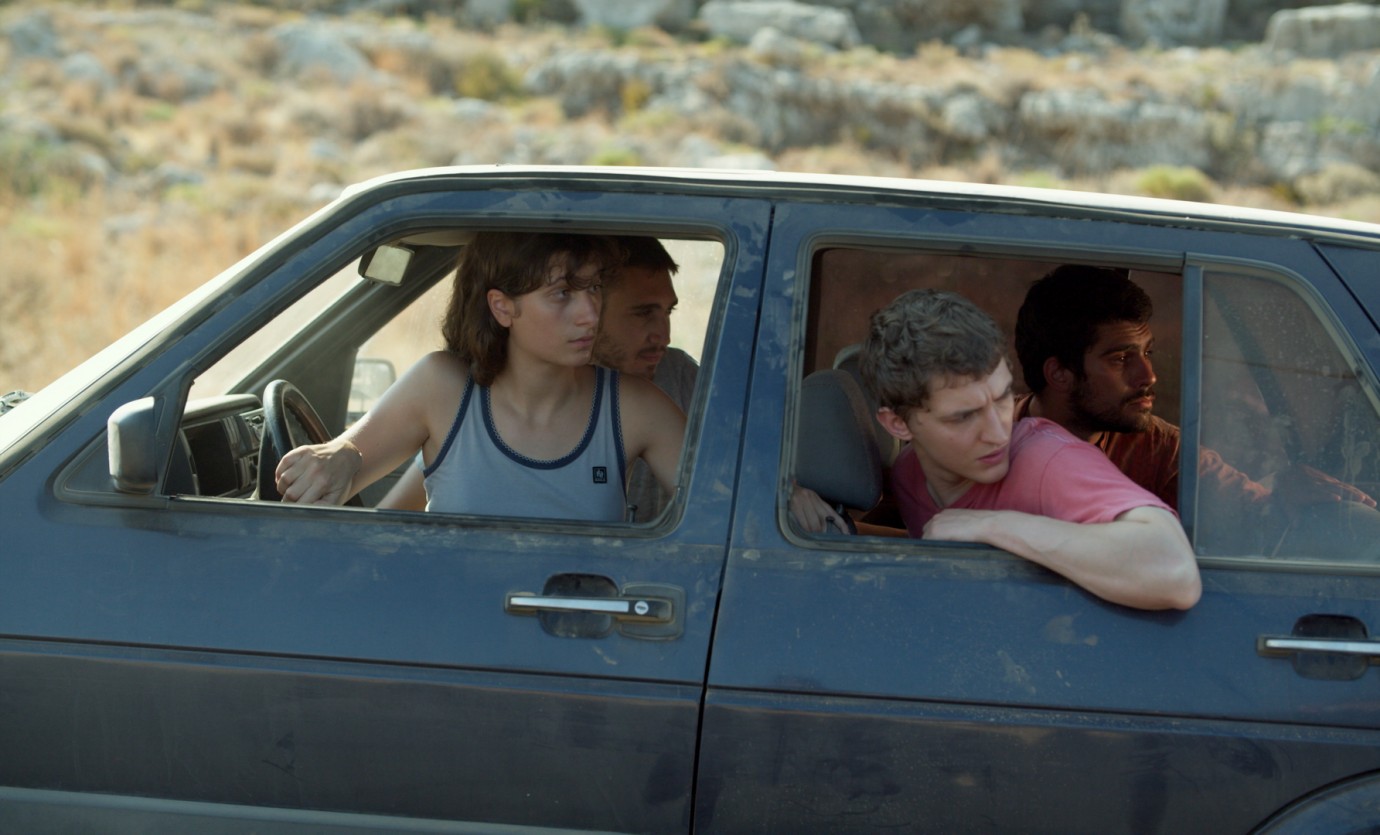Thirty or so minutes into Angela Schanelec’s Music, a character makes a startling discovery. We’re inside a prison on the outskirts of an unidentified Greek town, where Jon (Aliocha Schneider) is to spend a manslaughter sentence. And we’re watching him bathed in the cell’s cold light when he suddenly opens his mouth and starts to sing. It’s a moment that shatters the film, one of the loudest in a tale otherwise marked by wistful silences. Jon’s stuck a grocery list of classical composers to the wall, and he intones an aria from Vivaldi’s Il Giustino, “Vedrò con mio diletto.” It’s the first time we hear him sing and it amounts to an otherworldly revelation, both for the young man crooning and those of us who listen: a human being waking up to a superpower.
There’s a tendency to write off Schanelec’s cinema in medical terms. Her films are often pegged as “clinical,” her direction “surgical,” her style “antiseptic.” But the jargon fails to account for the tension between her meticulously designed compositions and the immense swaths of feeling with which they bristle. Music is no different. It’s a tale that opens with a death and goes on to be haunted by several others, yet never swells into a funereal march. Never dips into airless nihilism. It borrows from Sophocles’s Oedipus Rex, but only loosely––the connections between film and ur-text made all the blurrier by Schanelec’s decision to cast young actors (who all look the same age) for the roles of Oedipus, his mother Jocasta, his father Laius. Like its predecessor I Was at Home, But… it is shot by Ivan Markovic as a gallery of static tableaux that toggle between long shots and close-ups, which often capture characters through their disembodied limbs––a nod to Bresson in a film where hands and feet play as prominent a role as faces. The camera seldom moves in Music, but its immaculately composed shots aren’t cages: they’re portals through which emotions can leak and move freely.
That’s why, in retrospect, Jon’s epiphany behind bars feels so illuminating. Music is a salvific force, an escapist machine. The Vivaldi aria plays in full, and Schanelec––here again working as her own editor––lets words and notes spill into another prison scene where Jon’s fellow inmates shower together as Vivaldi reverberates around them. The look that congeals in their faces is one of pure bliss: a short-lived moment of happiness that disintegrates the walls around them and lifts Music into a transcendental region. Like the cover of Bowie’s “Let’s Dance” that ricocheted in I Was at Home, But…, it’s a sequence designed to question the stillness of all you saw before and heighten your receptivity to the film’s twitched aliveness.
Here as in her previous, Schanelec shows a proclivity for long, uninterrupted takes. But “slow cinema” Music is not; if anything hers is the film that mounts a challenge to the meaning and limits of that label. Many things happen in its 108 minutes and they happen fast. The film kicks off in 1980, when newborn Jon is abandoned in the middle of the countryside and then adopted by a local couple (Marisha Triantafyllidou and Argyris Xafis); next we see him, he’s in his twenties, roaming a sun-scorched shore with some pals when he accidentally kills a young man, which sees him shipped to prison. It’s here that he meets and falls for his warden, Iro (Agathe Bonitzer), whom he marries and has a daughter with, unaware of the woman’s ties with the man he killed. By the time Music wraps we’ve been made to witness deaths, homecomings, suicides, funerals, exiles, rebirths. We begin in the barren, sweltry Greek coast and wind up in Berlin, where Jon and his teenage daughter Phoebe (Ninel Skrzypczyk) take up residence and form a new makeshift family.
For all its languorous scenes, Music has a steadfast velocity Schanelec achieves through heavy use of ellipses. It’s a strategy that can make the plot sometimes harder to decipher, but those willing to suspend the urge to connect all the dots and submit instead to its mystifying grace will find it teeming with visual and emotional riches. This film is not made hermetic by all its excisions; it is all the more evocative for them. Here the narrative is channeled and experienced through the bodies and landscapes; its eloquence lies in the structuring of its omissions––the things Schanelec chooses to reveal and those she doesn’t.
Speaking of bodies: Schneider and Bonitzer grace the screen as statues carved from alabaster. None of the principals ever age, a choice that pulls the couple away from our mortal milieu and thrusts them skyward into the realm of gods and myths. Yet Music makes room for several vulnerable moments wherein interactions between characters take a heartfelt, tender note. There’s nothing surgical about the way Schanelec frames Jon’s homecoming, when the lad finds his mother waiting for him outside the old family house, and the camera keeps their faces offscreen to single out instead his hand as it reaches hers, the potency of the reunion refracted in a shot of two palms finding each other. And there’s nothing clinical about the way Jon is shown helping his father get up, later, as the family will quietly march behind a hearse. Music is a beguiling film, one whose steady, exquisitely crafted frames only amplify the strength of emotions thrumming just beneath them.
Music premiered at Berlinale 2023 and will be released by Cinema Guild.

